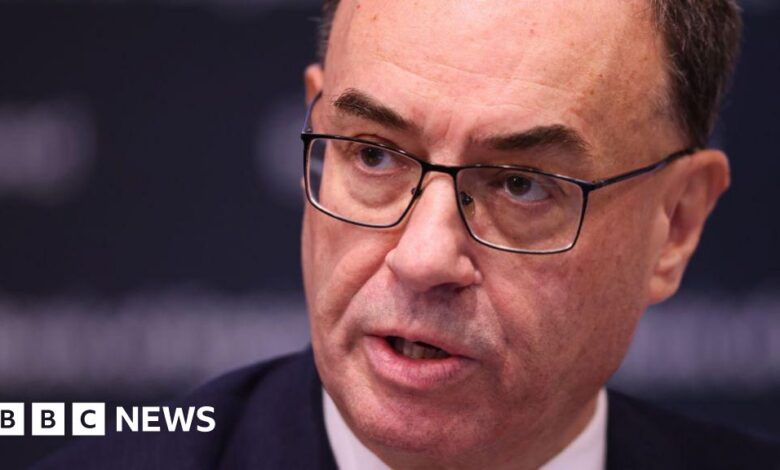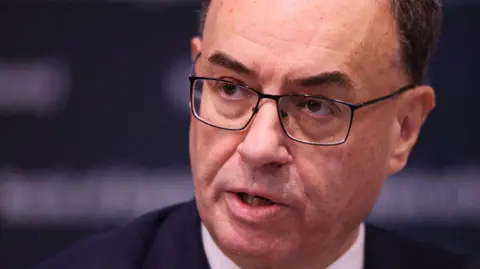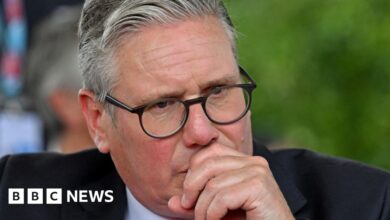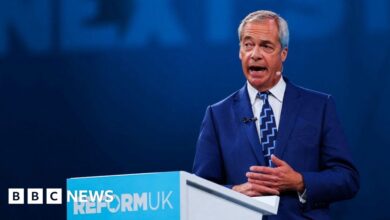Bank of England boss says UK must ‘rebuild relations’ after Brexit

 Getty Images
Getty ImagesThe UK must “rebuild relations” with the EU “while respecting the decision of the British people” who voted to leave in 2016, the Bank of England’s governor has said.
Andrew Bailey’s Mansion House speech to investors marked some of his strongest comments yet on Brexit, saying one of its consequences has been weaker trade.
He has previously avoided commenting on the topic because of the Bank’s independence from Westminster politics.
Mr Bailey said the changed relationship with the EU has “weighed” on the economy.
“As a public official, I take no position on Brexit per se,” he said. “But I do have to point out consequences.”
He went on: “The impact on trade seems to be more in goods than services… But it underlines why we must be alert to and welcome opportunities to rebuild relations while respecting that very important decision of the British people.”
The government remains opposed to rejoining the EU, but Chancellor Rachel Reeves also said in her Mansion House speech there could be a closer relationship.
“Our biggest trading partner is the European Union. We will not be reversing Brexit, or re-entering the single market or customs union. But we must reset our relationship,” she said.
Mr Bailey said that the UK should not focus “just on the effects of Brexit”, warning about “geopolitical shocks and the broader fragmentation of the global economy”.
He made a similar comment last week when asked about US President-elect Donald Trump and his threat to impose tariffs of up to 20% on imports.
Vicky Pryce, chief economic adviser to the Centre for Economics and Business Research, said if that were to happen, “it is actually quite questionable whether the UK could have a special relationship with the US when it still trades quite substantially with Europe”.
‘A better deal’
Assessing the impact of the UK’s decision to leave the EU on the economy has been tricky given the multiple economic shocks in recent years.
The Office for Budget Responsibility and other independent analysts estimate the economy will take a 4% hit over 15 years as a result.
Goods trade, especially in food and farm exports, has been especially hit by the imposition of new trade barriers. Trade in services, such as banking, has done better than expected, however.
Some politicians have said there could be a better relationship between the UK and the EU.
“We need to be positive here and optimistic that a better deal can be actually closed on that front,” Spain’s Finance Minister Carlos Cuerpo told the BBC.
Meanwhile, Sir John Gieve, former deputy governor of the Bank of England, said the UK could negotiate “some deals around the edges which reduce the barriers to trade”.
He too ruled out rejoining the single market or customs union, but told the BBC’s Today programme: “If we could, in due course, get close to joining the customs union I think that would be a major help.”
He added it would mean “people would invest in Britain… in the knowledge they could freely export into Europe, as they did before Brexit”.
‘Crown jewel’
In her speech, Reeves said that regulations brought in after the 2008 global financial crisis “resulted in a system which sought to eliminate risk-taking”, adding that has now “gone too far”.
She said financial services in the UK were “the crown jewel in our economy” but added “we cannot take the UK’s status as a global financial centre for granted”.
The government will publish a financial services strategy in the spring, focusing on fintech, sustainable finance, asset management, insurance and capital markets, “laying the foundations for more private investment”, Reeves said.
Mr Bailey’s speech went on to address the wider UK economy and its lack of growth.
He described how productivity has fallen since the 2008 economic crash and has not recovered since.
He said the UK is not alone in having this problem, which he said also affects other parts of Europe, but noted that the US has “a better story to tell”.
Mr Bailey also echoed Reeves’ concern that the UK pension system is “fragmented” and requires “heavy lifting” to fix it.
Shadow chancellor Mel Stride said the Conservatives would “study the detail of these reforms, many of which follow on from those we were pursuing in government”.
But he added that reforms “aimed at increasing growth will be significantly undermined by Labour’s Budget, which sent precisely the wrong signal to investors and wealth creators”.




